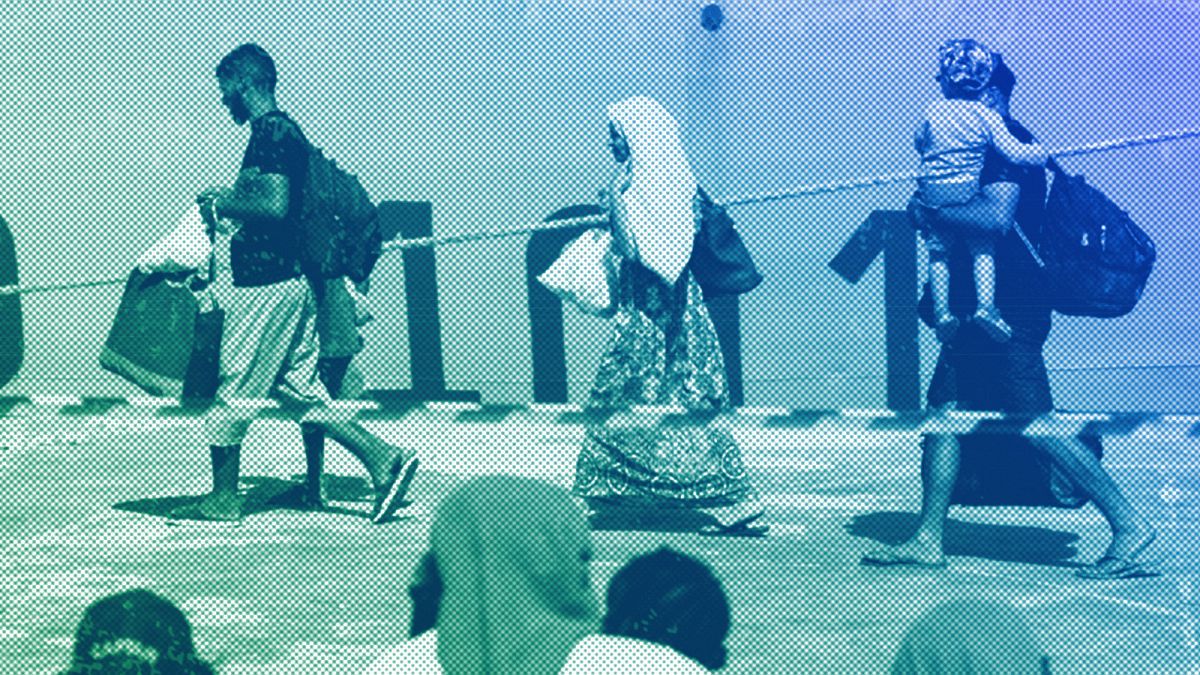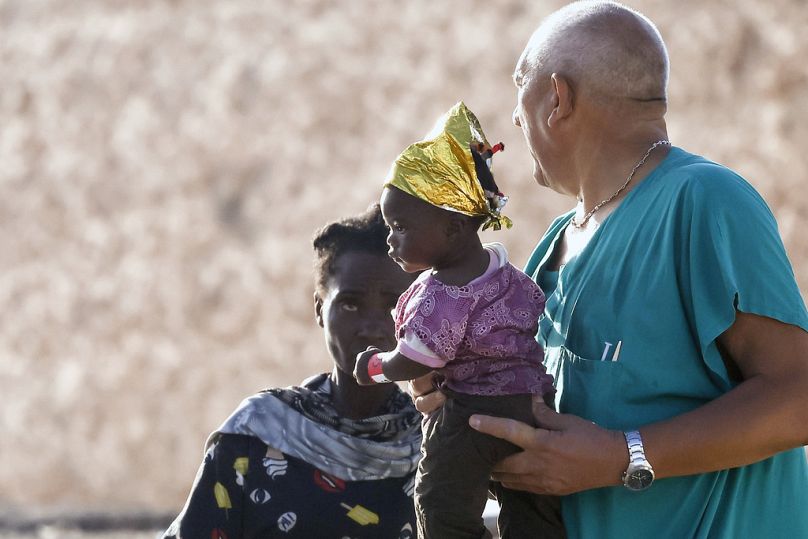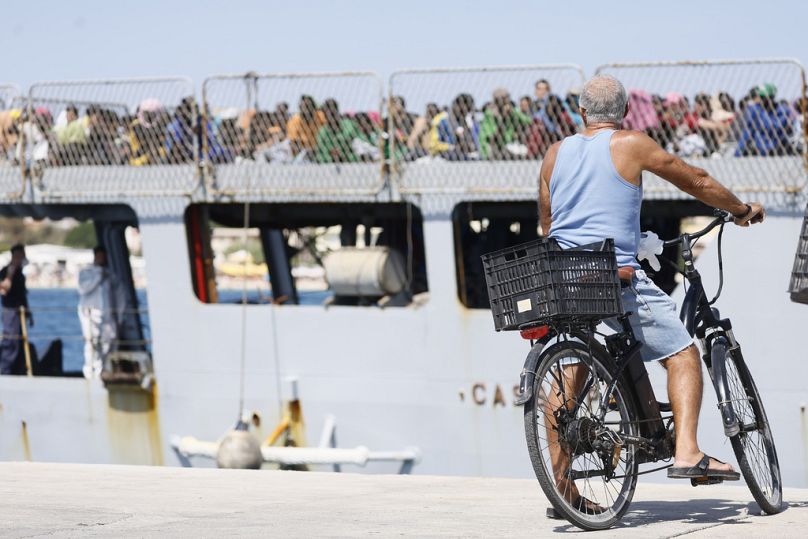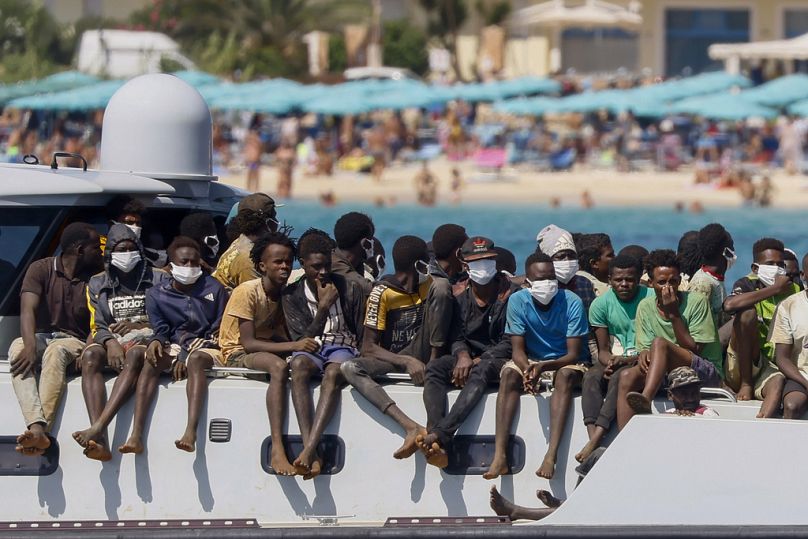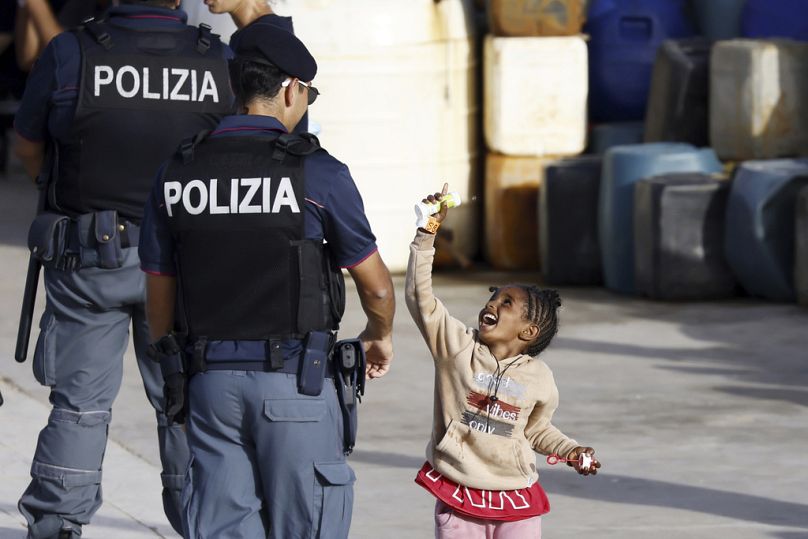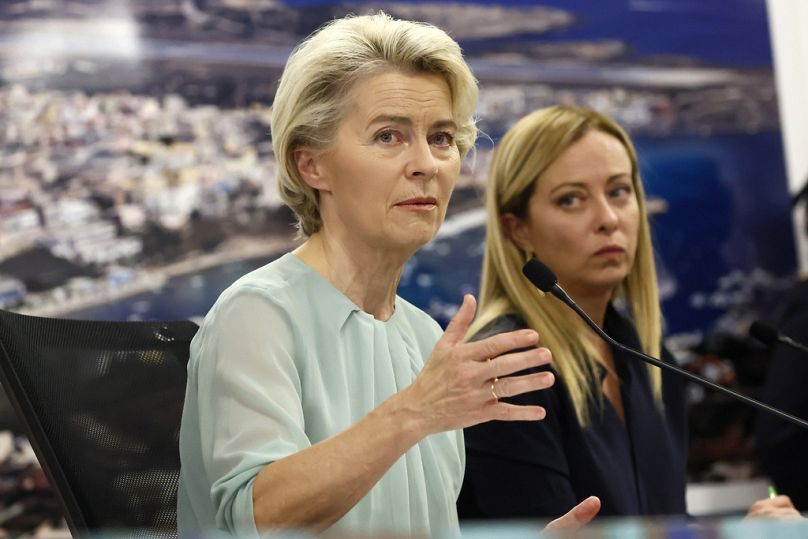Following the latest spike in boat arrivals to the Italian island of Lampedusa, Euronews View spoke to MEP Pietro Bartolo about what migration means for Italy and Europe and whether the continent can find a viable and fair way to solve the crisis.
The small Italian island of Lampedusa made international headlines again last week after a surge in boat arrivals to Europe saw at least 11,560 people land on its shores.
The 6,000 resident-strong island, which is closer to the Tunisian coast than mainland Italy has been the focal point of migrant routes for decades.
However, the latest spike in arrivals was seen as yet another sign of a growing predicament for Europe, with Italian Prime Minister Giorgia Meloni and European Commission President Ursula von der Leyen both visiting Lampedusa to pledge a doubling down on the continent's efforts to curb it.
At the same time, critics believe a concrete solution to the humanitarian crisis, which has become a highly divisive issue for most Europeans, is yet to be found.
Meanwhile, thousands remain stranded in what has been described as difficult conditions, with many more expected to make the same dangerous journey across the Mediterranean Sea.
Euronews View spoke to MEP Pietro Bartolo (PD, S&D), a surgeon and Lampedusa native who served as the chief medical officer for refugees and migrants arriving on the island for 27 years, about perceptions of migrant arrivals in Italy and Europe, merits of the current political approach to the ever-unfolding situation, and whether Europe can find a viable and fair way to solve the crisis.
Euronews View: For many people, especially journalists and activists, the latest news out of Lampedusa felt like a 'Groundhog Day'-type scenario, where no matter what is done, the story repeats itself. What is it that we have failed to learn?
Pietro Bartolo: The story that seems to be repeating, in my opinion, is that of bad agreements with third countries from which migrants depart or transit.
We have ample experience showing that reducing migration and asylum policies to externalising borders and the so-called “strategic partnerships”, especially if signed with countries that have poor human rights and rule of law records — from Turkey to Libya, and now Tunisia — does not solve the problem.
On the contrary, the numbers tell us that departures are increasing. Moreover, it is a disgraceful strategy that goes against the values of the Union, giving a blank check to dictators in order to keep the flow tap closed, without questioning what the fate of those who want to reach Europe for a hopefully better future will be.
Therefore, if there is one truth that we have not learned, it is that the EU must change its approach when shaping its migration policies; we need legal channels of entry.
Euronews View: You were born in Lampedusa and know the island community quite well. Has the reaction of Italians living on the island to people arriving changed over time?
Pietro Bartolo: The inhabitants of Lampedusa have always been a model of solidarity and hospitality.
Even after the high number of arrivals of the last days on the island, a real solidarity race has taken place, with people who have opened their homes to feed, welcome and temporarily assist migrants.
This has always been the approach of the Lampedusans. Due to its geographical location, Lampedusa is the first strip of land between Africa and Europe, a natural landing place for those crossing the Mediterranean, both for flocks of birds and for people fleeing war, hunger and violence.
This marked the identity of those who live here. In addition, Lampedusa is a land of fishermen, and for fishermen everything that comes from the sea is welcome.
Euronews View: In your opinion, what are Europeans failing to see or don’t understand when it comes to refugees and migrants arriving on the continent?
Pietro Bartolo: They do not realise that migration is not an emergency but something structural, it has always happened and is an integral part of the history of humanity.
Those who flee political and religious persecution, hunger and poverty in search of a better future, have the right to try.
People must understand that this epochal challenge of our century is not only a problem concerning countries bordering the Mediterranean, but must be dealt with at the European level.
Only a sharing of responsibility and a collective effort by all 27 member states will lead to concrete results.
Euronews View: How do you comment on last week's visit of European Commission President Ursula von der Leyen and Italy PM Giorgia Meloni to the island?
Pietro Bartolo: Unfortunately, it's one of many symbolic visits that does not lead to concrete proposals on how to deal with a dramatic situation, and we've had plenty of these visits in the last decade.
I was greatly disappointed by the European Commission President's support for the EU-Tunisia agreement.
Euronews View: How do you feel about people, including experts and journalists outside of Italy, believing that most Italians agree with Meloni’s stance on migration?
Pietro Bartolo: I do not think things are that way. They want us to believe that this is the truth but it is not, and my election serves as a type of proof to the contrary.
During the last European election campaign, I spoke only about migration, bearing witness to what I saw and touched first-hand in the thirty years in which I was a doctor, acting as the responsible medic who gave migrants their first medical examination after disembarking on the island.
If you add up the votes in the two constituencies in which I was elected, I had the most, second in overall number of preferences only to [the far-right Lega party leader Matteo] Salvini, who topped the list in all constituencies.
I will also tell you another thing: in the encounters I have over the weekend in schools with students but also in other contexts throughout Italy, there is always someone who approaches and tells me: "Thank you, listening to you was enlightening. They've taught us a whole different narrative these years."
We must never stop telling the truth about the migration phenomenon. Not only for those who seek to rebuild their lives but also for Europe and its citizens.
Euronews View: What would be a fair solution to the issue, and is it realistic to expect the political will needed to implement it following the upcoming European election in 2024?
Pietro Bartolo: I hope that there will be a significant reform in this legislature already. I realise it may seem unrealistic, but we cannot discourage ourselves and give up on such an important issue.
The EU has the opportunity to amend once and for all the Dublin Regulation which puts the weight of managing migration disproportionately on the countries of first entry.
Ultraconservatives and Eurosceptics prefer to fuel fears and hatred of migrants for electoral reasons.
They talk about illegal immigration, pretending not to see that today those who arrive in Europe are mainly asylum seekers, people fleeing wars, violence or natural calamities.
The negotiations to approve the new Pact on Migration are underway, and I will do everything I can to bring about a change of course towards solidarity and sharing of responsibility, and to find a way to mediate it that goes in the direction that progressive forces have been hoping for for years now.
We need to change the paradigm and address the migration phenomenon with a humane, rational, and long-term approach.
